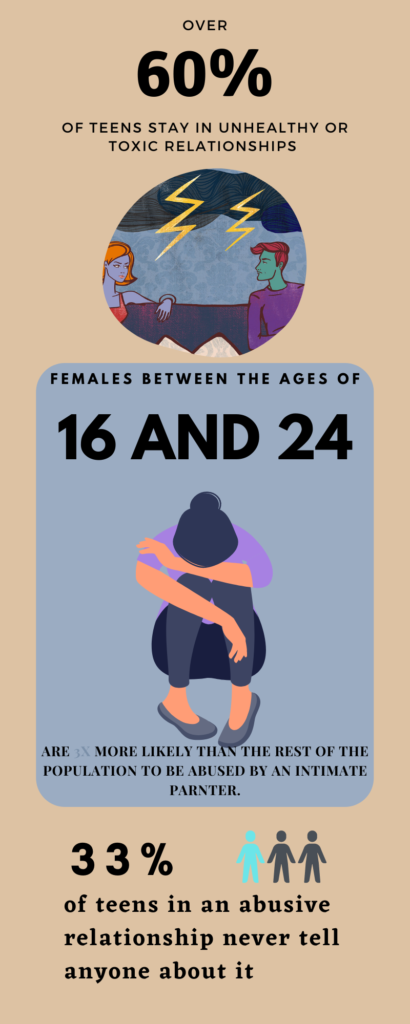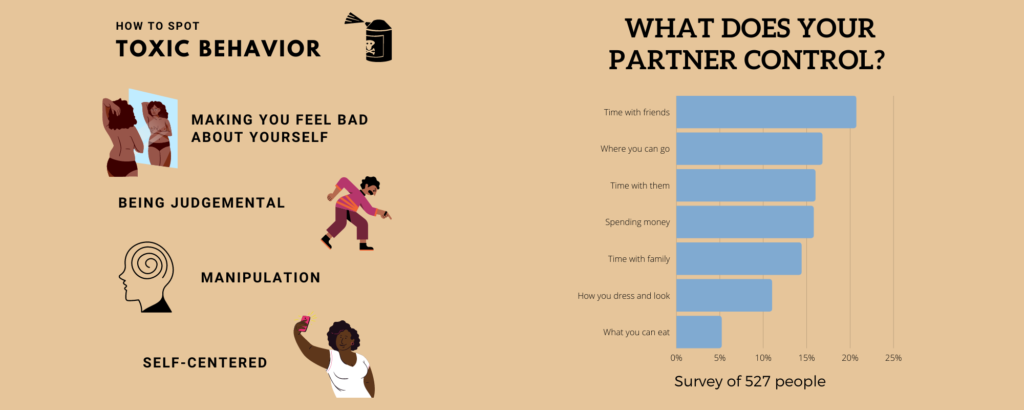Choosing to enter a relationship with someone is one of the more human experiences of our lifetime. Deciding to share one’s love, time, emotions, thoughts, good and bad times with another person is a vulnerable task many find daunting. Most of the time, these relationships blossom into the most fulfilling aspects of our personal lives. Other times, they spiral into the most draining.

According to Forbes magazine, an average of 80% of Americans have experience emotional abuse from either a friend or partner. Most of the time, this abuse is subtle. Occasional manipulation of personal information, undermining one’s self-esteem, and egocentric behavior are some of the ways in which a partner can damage one’s mental health subliminally without being explicitly insulting or degrading.
While emotionally toxic relationships may not have the same hazards as physically abusive relationships, the effect on one’s psyche can be just as debilitating. The long-term consequences of psychological abuse from a trusted partner include low self-esteem, anxiety, social withdrawal, post-traumatic stress disorder, suicidal ideation, and depression.
While females between the ages of 16 and 24 are three times more likely than the rest of the population to be abused by an intimate partner, 4 in 10 men reported having experienced at least one form of coercive control by an intimate partner in their lifetime according to the National Coalition Against Domestic Violence.
No one is safe from being taken advantage of by a romantic partner, whether it be psychologically, emotionally, physically, or all of the above. Women and men trapped in abusive relationships often struggle to acknowledge the imbalance of power and respect between them and their partner. Furthermore, once they come to realize they’re being abused, the odds they find the courage to leave the relationship are staggeringly low. About 60% of people stay in toxic relationships according to a survey of over 2,000 adults.
A survivor of emotional abuse herself, Jenny Barger knows all too well the devastating toll it can take on both physical and mental health. She was able to escape her situation, but unfortunately that was an exception, not the norm.
Jenny’s relationship left her feeling lost, insecure, and stagnant. The weight of her ex-boyfriend’s emotional abuse had dragged her away from her other personal relationships and her passions. Once she realized she was lamenting a relationship that made her unhappy, she committed to working on herself for no one else but her. Now, she is not only a woman with an impressive and inspiring outlook on life, but also an advocate for others stuck in toxic situations.
“It ended up being the best thing because now I can actually put the love I was giving to someone else towards myself.”
Jenny Barger
The best way to avoid toxic relationships is to work towards a healthy relationship with oneself first and foremost. Self-respect is the number one deterrent to tolerating disrespect from others. Keep the good eggs, distance from the negative nellies and emotional drainers, and focus on quality, not quantity. Abuse is not to be expected from someone meant to be a companion.

For help or advice regarding abusive relationships, visit Domesticshelters.org to access professional assistance.
Sources
- https://www.bustle.com/articles/126572-too-many-people-stay-in-bad-relationships-new-survey-says-and-heres-why
- https://assets.speakcdn.com/assets/2497/domestic_violence_and_psychological_abuse_ncadv.pdf
- http://www.apa.org/topics/violence/partner.aspx?item=2
- https://www.whitehouse.gov/sites/default/files/docs/vawa_factsheet.pdf
- http://www.bjs.gov/content/pub/pdf/ndv0312.pdf
- http://www.apa.org/news/press/releases/2014/04/domestic-violence.aspx
- http://www.bjs.gov/content/pub/pdf/ipv9310.pdf
- http://www.cdc.gov/violenceprevention/pdf/nisvs_report2010-a.pdf
- https://ncadv.org/files/Domestic%20Violence%20and%20Psychological%20Abuse%20NCADV.pdf
- http://www.cdc.gov/violenceprevention/pdf/cdc_nisvs_victimization_final-a.pdf
- https://www.ncjrs.gov/pdffiles1/ojjdp/232272.pdf
- http://stopabuse.umich.edu/survivors/planning.html
- http://www.standffov.org/statistics/
- https://www.dosomething.org/us/facts/11-facts-about-teen-dating-violenceiolence
- www.loveisrespect.org
- https://www.mentalhelp.net/aware/physically-and-emotionally-abusive-relationships/
- https://www.forbes.com/sites/nazbeheshti/2020/05/15/an-average-of-80-of-americans-have-experienced-emotional-abuse/?sh=25372e947b49
